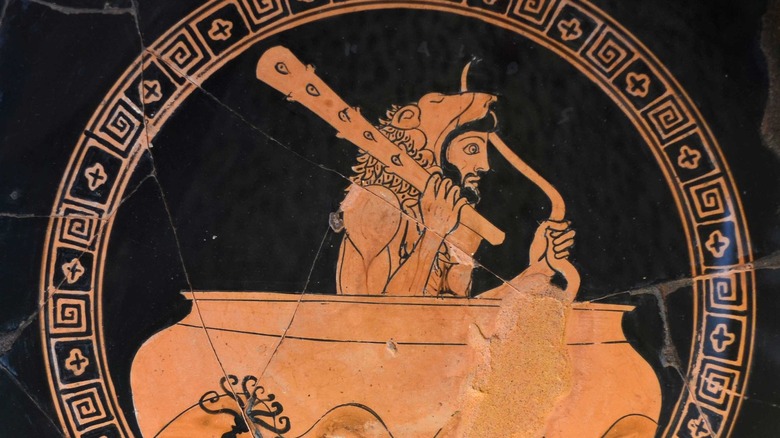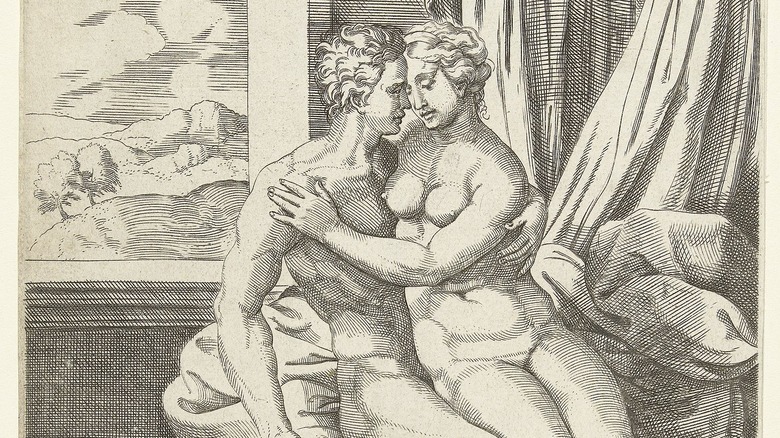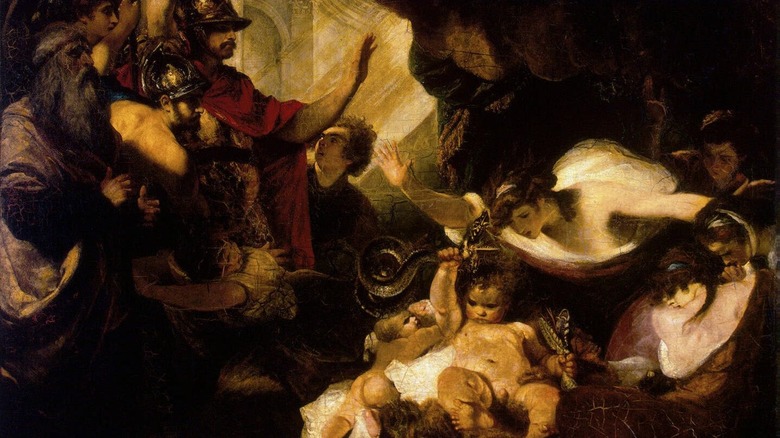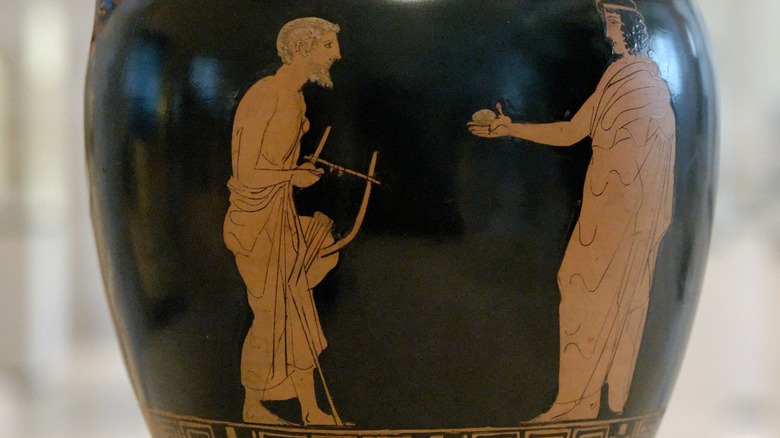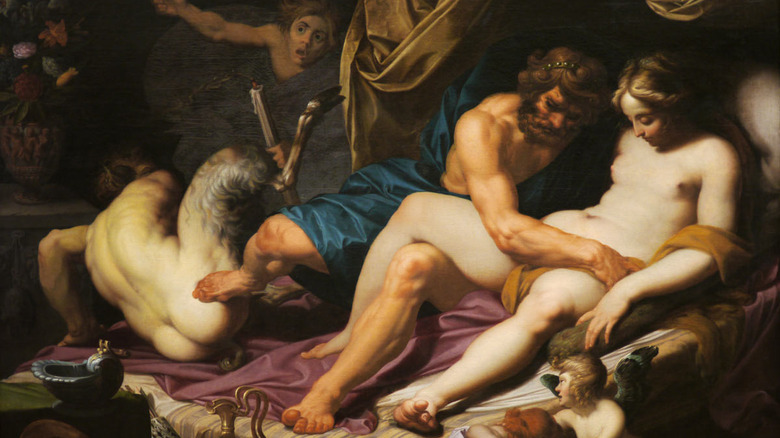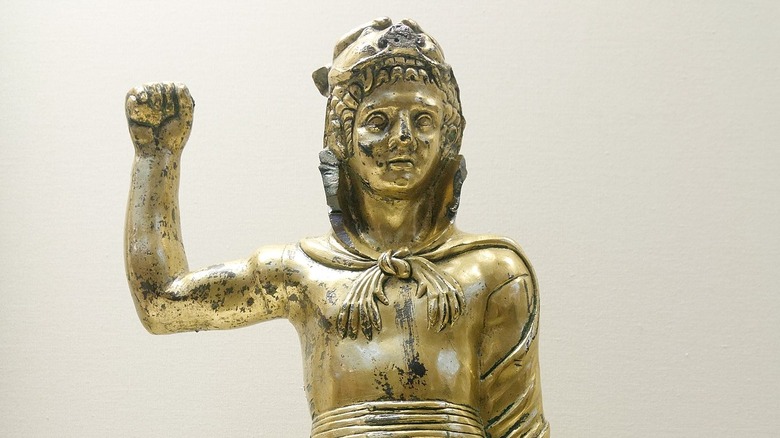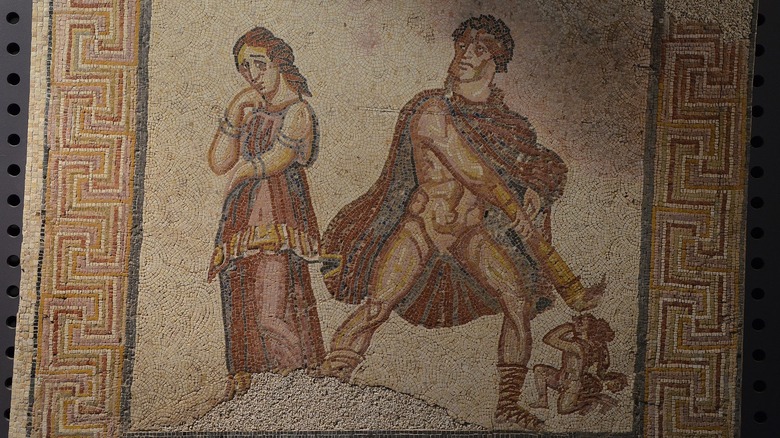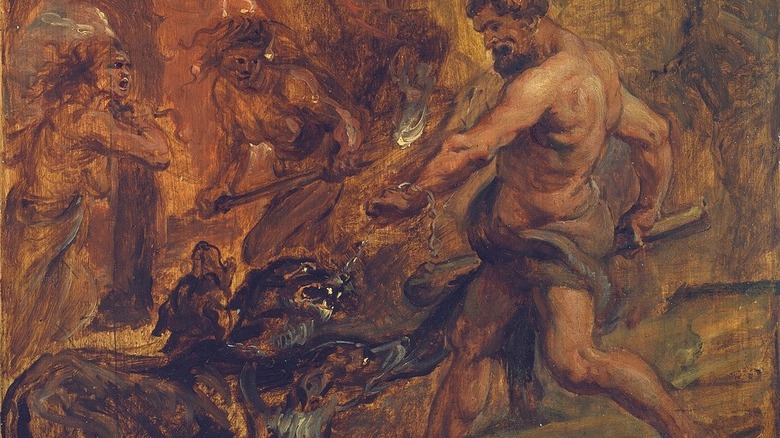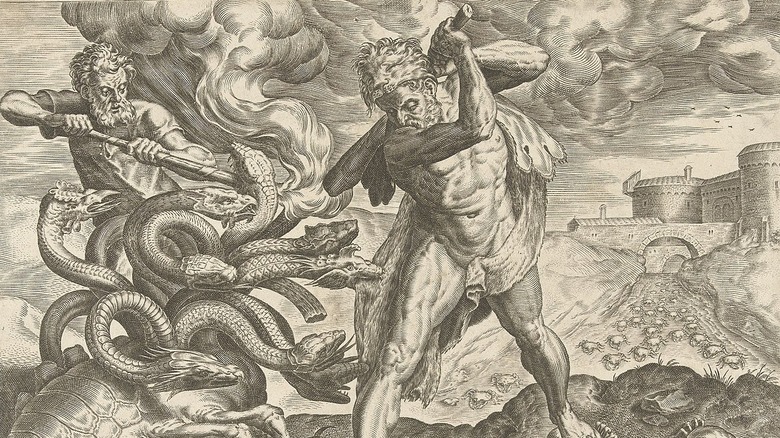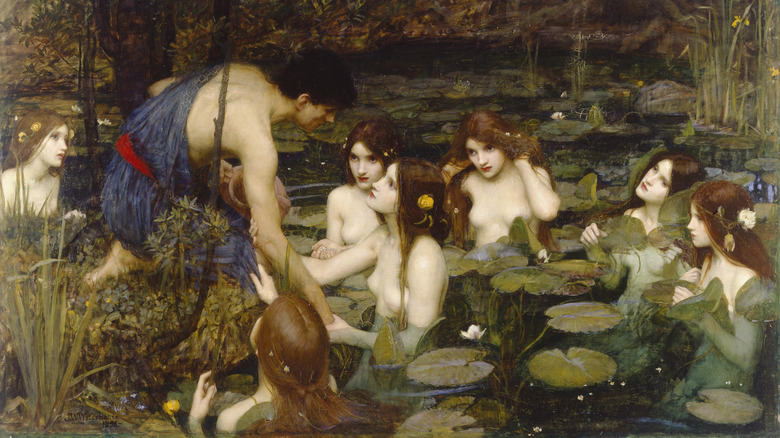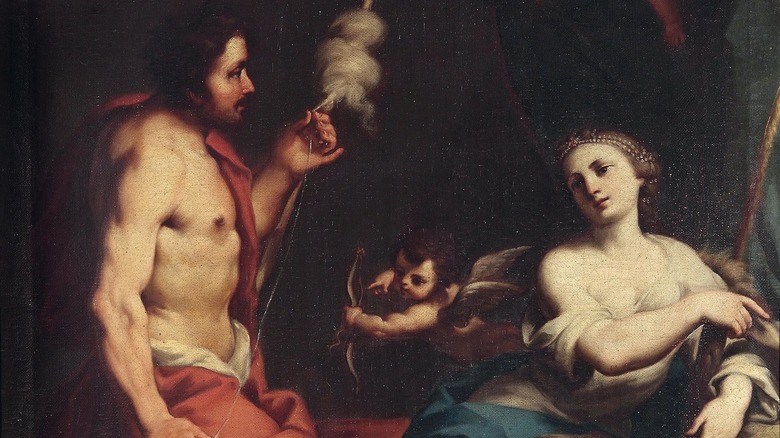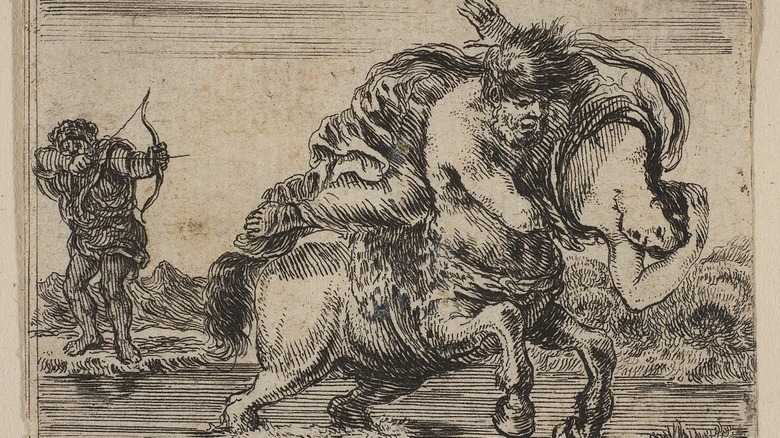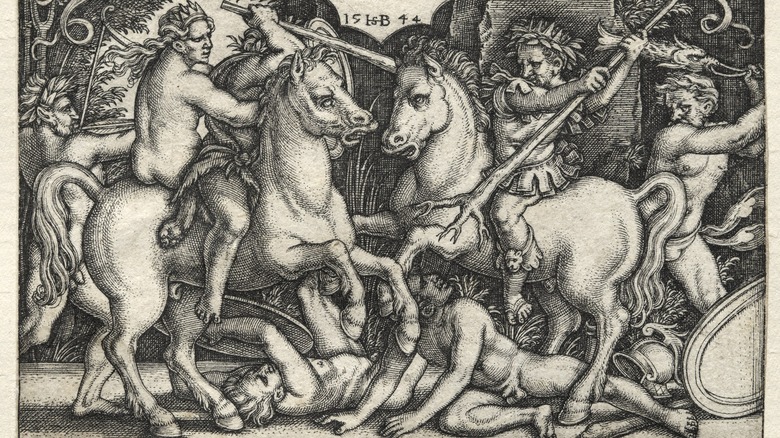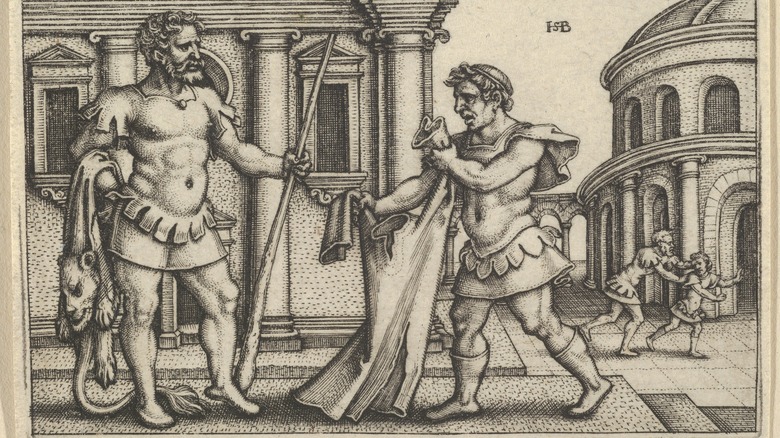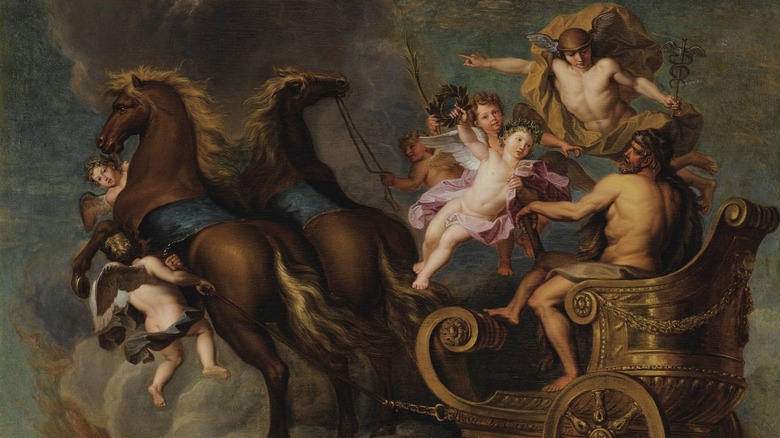The Mythology Of Herakles Explained
Of all the Disneyfied heroes from mythology and folklore, Millennials might have the most warped perception of Herakles from how he was actually described by the ancient storytellers. That is not a criticism of the 1997 film "Hercules," but a reminder to see it for what it really is: an entertaining tale for modern audiences. The cartoon protagonist simply was not the Herakles (or Hercules) of the Classical world, and for very good reason. Much of the legendary demigod's life was dark, violent, or very erotic, which are all things not usually recommended for children's movies.
Some of the qualities that made Herakles a hero to the Greeks are still respected today. Honestly, who in their right minds would not want the strongest man in the world on their side in a fight? Especially when forced to confront terrifying monsters. Plus, he was a good friend who could help even when the odds seemed impossible. People of today might also appreciate that the demigod loved freely, and was unconcerned whether his companions were women or men.
With that said, Herakles had a side to him that could be more cruel than the supposed monsters he hunted for. Even when not driven insane by powers out of his control, he still did horrible things. But that is one of the most important lessons of his story: Even the greatest men can have terrible faults, and no one is above justice.
Herakles was the son of Zeus and Alcmena
Herakles was the son of not just a god, but the king of all deities: Zeus. His mother, Alcmena was a mortal woman, yet also was a descendant of the legendary Perseus, which made Herakles an heir to the throne of the main kingdom of Greece, Mycenae. One major problem was that Alcmena was already married when the god came to her bed, but that never seemed to bother Zeus much at all.
While her husband, the general Amphitryon, was away fighting pirates, Alcmena was deceived by Zeus, who took the man's form and slept with her. Without her knowing the difference, the real Amphitryon returned and made love to his wife as well, so Alcmena later gave birth to a half-god son, Herakles, and his mortal twin brother, Iphicles, who was fathered by Amphitryon. As a demigod, Herakles was gifted with superhuman strength and extraordinary stamina, says World History Encyclopedia. It did not take long before he had to use those powers to save his own life.
The goddess Hera hated Herakles
Since Herakles was the illegitimate son of her husband, Zeus, Queen Hera hated the demigod from the very beginning and took steps to make sure that he did not become the king of Mycenae. Thanks to Hera's cruel manipulations, that honor fell to Herakles' relative, Eurystheus, says Britannica. Zeus had decreed that whomever was born first would be the new ruler, which led Eurystheus to be born prematurely while Herakles' birth was delayed, making the ordeal far more painful for Alcmena.
Even worse, Hera sent snakes to kill Herakles when he was still an infant. He and his brother, Iphicles, were only a few months old when the venomous creatures slithered their way onto the bed and awoke the babies. Iphicles shrieked in terror at the sight, but Herakles grabbed each one and used his incredible strength to strangle the serpents to death. Once their alarmed parents reached the room, Alcmena and Amphitryon found the infant demigod holding up the two dead snakes while laughing with glee.
So far, Herakles survived Hera's devious schemes, but these would not be the last times the goddess would attempt to ruin the demigod's life. In fact, the name Herakles means "Glory of Hera" and was given to him in recognition of the incredible plights he faced because of the goddess.
Wrath was Herakles' worst flaw
Even though Herakles was not his son, Amphitryon raised the boy as if he were his own. Throughout his youth, Herakles was taught by the best tutors, including Linus, who instructed the demigod in music. But Herakles was so bad at singing and playing the Lyre that the teacher lost all patience with the pupil and lightly smacked him on the side of the head in frustration during one lesson. That was a big mistake.
No matter how weak the hit was, Herakles became furious and struck Linus in the head with his lyre, instantly killing him. It was the first time the demigod murdered someone without intending to, but it would not be the last, according to "Mythology: Timeless Tales of Gods and Heroes." On this occasion, and every time other time Herakles committed a terrible act on accident, he was always very apologetic afterwards, though it never stopped him from making similar mistakes throughout the rest of his life.
Herakles slept with the 50 daughters of King Thespius
After Herakles turned 18, he was informed that the gigantic Thespian lion was terrorizing the countryside near Mount Cithaeron, so he decided he would be the champion to remove this deadly threat. During the Cithaeronian hunt, it took Herakles 50 days to catch the elusive beast, but the teen was more than happy to spend his nights in the home of the local ruler, Thespius.
King Thespius was awed by the young man rumored to be the son of Zeus and wanted the champion to help him more than just by slaying the enormous monster. With the help of wine, the king easily managed to get Herakles lie with all 50 of his daughters so that his grandchildren would have the same blood as the great demigod, according to "Oh My Gods: A Modern Retelling of Greek and Roman Myths."
Maybe because he enjoyed his wine too much, or just because he was not the smartest, but Herakles never realized that he was sleeping with a different woman every night. It was of no concern to the demigod though, as the encounters were simply his amusement while he completed his mission. Herakles eventually hunted down and killed the Thespian lion, and then used the beast's head as a helmet, along with its skin as a cloak.
Herakles led the Thebans to victory on the battlefield
When Herakles was returning home to the city of Thebes, he happened to see with his own eyes the massive tribute his people were forced to pay the Minyan army that dominated them. The Thebans handed over 100 cattle every year to the Minyan king, Erginus, according to Hellenica World. The humiliating sight infuriated the demigod so much that he mutilated the Minyan heralds sent to collect the tribute by cutting off their hands, ears, and noses, and gave those ghastly remains as payment to Erginus instead.
The king of the Minyans was not pleased to say the least. Erginus declared war on Thebes and led his army to the city gates, demanding that Herakles answer for his crimes. Meanwhile, Herakles gathered a group of young warriors in the city to confront the invaders. To arm themselves, the Theban defenders broke into an old temple to collect weapons that had been stored long ago as gifts to the gods.
When the two sides clashed, Herakles led the Thebans to victory, not only slaying Erginus and most of his forces, but also going so far as to destroying the Minyan capital as well. As a reward for his help in freeing his people, King Creon of Thebes allowed Herakles to wed his daughter, Megara.
A curse of madness drove Herakles to murder his family
After Herakles had been happily married to Megara for years and had three children with her, Hera chose to strike a devastating blow to the demigod. The vengeful goddess used her power to drive him crazy to the point that he literally lost his mind. In his madness, Herakles murdered his entire family before his sanity returned.
According to "Oh My Gods: A Modern Retelling of Greek and Roman Myths," Hera's magical hold over Herakles was so strong that it took the intervention of the goddess Athena for him to gain control of his mind again and truly see for the first time the shocking brutality in front of him. The demigod broke down in devastated wails over the atrocity he had committed and nearly took his own life but was ultimately talked out of it by his friend, the great hero Theseus, as explained in "Mythology." In the hope to relieve his deep despair, Herakles traveled to Athens with Theseus, but his stay was brief, as he soon sought out the oracle at Delphi for answers.
Herakles completed the legendary 12 labors
To atone for the grievous sin of killing his wife and children, the oracle at Delphi told Herakles to follow the orders of King Eurystheus, the man who took his place on the throne of Mycenae. Eurystheus gave the demigod 12 missions that seemed impossible to accomplish, from slaying the invulnerable Nemean lion to retrieving the guard dog Cerberus from the underworld. At one point in his quests, Herakles managed to hold up the heavens and the earth for the titan Atlas, says World History Encyclopedia.
Somehow, the hero overcame every obstacle thrown his way and completed each extraordinary task. Yet even when Herakles succeeded, sometimes the results were not good enough for Eurystheus, so what initially was supposed to be 10 labors eventually increased to 12 overall. In the end, the horrifying sight of Cerberus brought before him caused the king to want nothing more to do with the labors, and thus Herakles was free to live out the rest of his life in peace. However, the demigod's predictably volatile personality meant he would never truly live peacefully.
The Hydra provided Herakles with lethal venom arrows
To accomplish the second labor, Herakles slayed the Lernaean Hydra, and afterwards cut open the creature's body to dip his arrows in its poisonous venom. From then on, his huge quiver carried a large amount of the envenomed projectiles that Herakles used as formidable weapons for the rest of his life, as explained by "Greek Fire, Poison Arrows & Scorpion Bombs: Biological and Chemical Warfare in the Ancient World."
The lethal missiles were very useful in any fight, but the weapons also caused much unforeseen and unintended devastation to Herakles' life. When a group of centaurs attacked Herakles, he shot the poisonous arrows at the assailants as he pursued them, killing several in the process. Yet, as the demigod fired into the group, he also accidentally murdered his friend Chiron with the venom, after hitting him in the knee. Or, more accurately, the immortal centaur was in so much unbearable agony from the poison that the gods took pity on him and let him die.
Herakles was an Argonaut
When Jason went on his journey to seek the golden fleece, Herakles was one of the famous Argonauts who accompanied the hero on his expedition. The renowned demigod was even almost made the leader of the legendary crew, but he refused the honor and instead supported Jason as the rightful commander of the Argonauts, according to "Myths of the Greeks and Romans." Herakles was not yet done with his labors at the time, so the whole thing was really just a side quest for him anyways.
At first, it looked like Herakles was more devoted to the expedition than any of the other great heroes — he reprimanded them for seemingly abandoning the journey for the pleasure of the women of Lemnos. He also showed that he was one of the most powerful Argonauts when he defeated the six-armed giants called Earthmen.
However, after the demigod lost his squire, Hylas, Herakles' true devotion to the journey was revealed as he actually abandoned the Argo and its crew in a futile attempt to find his lover. Though unfortunately for Herakles, his companion was gone forever from the mortal world to become the husband of a water nymph.
Herakles was forced to sell himself as a slave
After years of serving Eurystheus while completing the 12 labors, Herakles was finally free, but it was short-lived. The demigod flew into another rage, and this time murdered Iphitus, the son of King Eurytus. Zeus punished his own son for this by forcing him to become a slave for the Lydian Queen Omphale for three years.
Omphale got sick enjoyment from tormenting Herakles by making a fool out of him as much as possible. One of her favorite ways to humiliate the demigod was by making him weave or spin in women's clothing for her own amusement. The queen also liked to wear his treasured lion head and fur cloak just because she knew how much it bothered him, according to "Heroes: The Greek Myths Reimagined."
Oddly enough, Herakles ended up falling for Omphale. He not only obeyed her commands without hesitation, but also kept her kingdom safe, and even had a child with her before his term of enslavement was over.
Herakles fought for his second wife, Deianira
Herakles had to battle for his second wife, Deianira, more than once. First, he fought the river-god Achelous because he also loved the young woman. The match was no easy feat for the demigod because Achelous had the form of a water snake with a vicious horn protruding from his forehead. The combat ensued for some time until a brutal end came abruptly when Herakles tore off the horn from Achelous' head.
The next time Herakles fought for his wife it led to catastrophic consequences for the demigod. After Deianira and Herakles were married, the centaur Nessus tried to abduct and have his way with the bride, but Herakles shot the creature in the back with one of his lethal arrows dipped in Hydra venom, according to "Greek Fire, Poison Arrows, and Scorpion Bombs: Biological & Chemical Warfare in the Ancient World." Yet before he perished from the poison, Nessus managed to convince Deianira to take some of his blood because he claimed it had magical properties that would work as a potent love potion.
Herakles went to war against King Eurytus
Herakles was finally happily married again after so many years, but still had unfinished business. The vengeful demigod blamed Eurytus for his humiliating enslavement, so after he was released, he raised an army, captured the king's city, and then promptly executed him. And in another example of how his monstrous behavior had no bounds at times, Herakles had Eurytus' entire family slaughtered, except for one.
Herakles captured the beautiful princess, Iole, and sent her back to his home with the pillaged booty, which was a huge mistake because it made Deianira very jealous. Once Iole arrived, Deianira could not help but notice how young and attractive the woman was, explains "Heroes: The Greek Myths Reimagined." The thought that her husband would make the former princess his concubine, or even more than that, filled Deianira with dread. In a panic, she could only think of one solution: to use the magical blood of the centaur Nessus, not knowing that it was extremely poisonous.
Herakles was poisoned by the bloody tunic
Fearing that her husband was losing interest in her, Deianira was resolved to use Nessus' so-called magic blood by rubbing it into a tunic that she then gave to Herakles. Once the demigod put the garment on, the deadly venom was triggered by the heat radiating from a sacrificial fire, according to "Greek Fire, Poison Arrows, and Scorpion Bombs: Biological & Chemical Warfare in the Ancient World." Herakles felt as if he was being burned alive and could do nothing to relieve the excruciating torment.
The pain was so intense even for the great hero that he ran in a frenzy throughout the countryside, screaming in agony and ripping up trees from their roots. When Herakles tried to alleviate the burning by jumping into a stream, the poison only intensified and irrevocably damaged the flowing water, causing it to become boiling hot from then on.
Since the tunic acted like acid and melded into his skin, Herakles could not take it off and lost all hope. In the demigod's last act as a mortal, he then had a pyre set up to literally burn himself to death so that his life would end, along with the unendurable torture.
Herakles became a god
As the fire blazed, a lightning bolt flashed down from above and struck the funeral pyre. Then, after some time, Herakles' companions checked the smoldering remains. They could not find traces of his body because he had ascended to Olympus as one of the gods, as explained by ThoughtCo. Zeus had sent the lightning to remove Herakles' earthly body and complete his celestial transformation, known as apotheosis.
In the heavens, the new deity resolved his long-standing issues with Hera so much that she allowed him to marry her daughter and honored cupbearer, Hebe, the goddess of youth. The robes of the Olympian queen were even used to fashion his godly form, which had replaced his mortal flesh. In one more impressive sign of respect, Zeus honored his favorite mortal son with the fifth largest constellation in the heavens.
It's a long way from the Disney version of Herakles.
